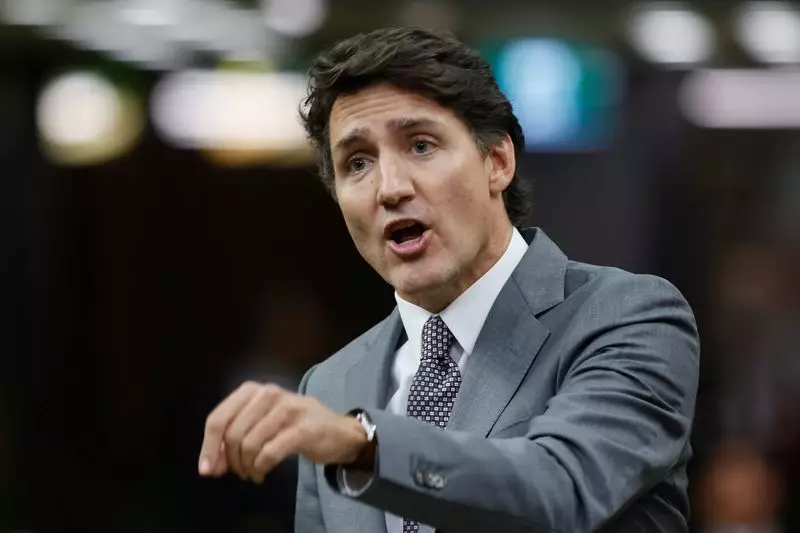In a significant political moment, Canadian Prime Minister Justin Trudeau’s Liberal Party faces a daunting battle in a crucial special election held in the Montreal riding of LaSalle–Émard–Verdun. Once regarded as a bastion of Liberal support, the electoral landscape has shifted dramatically, raising concerns about Trudeau’s leadership and the party’s future. The election was necessitated by the resignation of a Liberal lawmaker, and with public support waning, the stakes are higher than ever as the party attempts to retain this seat.
Recent polling data reveals a precarious situation for the Liberals, with predictions suggesting a tighter race than previously anticipated. Historically, this constituency has been a stronghold for Trudeau’s party; however, constituents are showing signs of discontent, creating an environment ripe for challenge. Should the Liberals fail to secure victory, it could serve as a catalyst for intensified scrutiny over Trudeau’s leadership, with potential calls for new leadership within the party booming louder.
Trudeau’s popularity has undeniably dwindled, exacerbated by issues such as rising inflation and a burgeoning housing crisis. Political observers note that after nearly nine years in power, the Prime Minister faces growing frustrations from voters who feel increasingly overwhelmed by economic challenges. This widespread discontent is transforming into a palpable call for change, as highlighted by Liberal MP Alexandra Mendes. Her remarks echo the sentiment of many constituents who believe that Trudeau is no longer the leader they need.
“Dozens and dozens of people” have voiced their desire for a shift in leadership, suggesting that the cracks in the Liberal foundation are becoming harder to ignore. Trudeau’s insistence that he will lead the party into the next general election, scheduled for no later than the end of October 2025, is countered by these growing challenges, leaving many to wonder if he can still rally support.
The political climate is further complicated by the impressive rise of the Conservative Party, now led by Pierre Poilievre. Recent polls reveal an alarming trend, with the Conservatives capturing a remarkable 45% of public support, dwarfing the Liberals’ standing at 25%. This compelment underscores an urgent dilemma for the Liberals, who must negotiate shifting voter preferences while contending with an invigorated opposition party.
The past elections offer a stark comparison; in 2021, the Liberals triumphed in LaSalle–Émard–Verdun with 43% of the vote, but the current polling suggests a distinctly different narrative—one where the Bloc Québécois and the New Democratic Party are emerging as formidable contenders in a three-way race.
The Liberal Party is acutely aware that a loss in this special election could trigger a wave of requests for leadership transitions, fueling dissension within the party ranks. Trudeau aims to counteract this by channeling voter emotions towards anger. In a recent speech, he attributed public dissatisfaction to economic burdens but failed to present a robust solution that could win back disillusioned voters.
In contrast, Poilievre’s conservative platform proposes immediate reforms, such as abolishing the federal carbon tax, which appeals to constituents struggling with affordability issues. This strategic focus on economic topics resonates with voters who face everyday challenges. Moreover, Poilievre has made headlines with his promise to limit immigration until adequate housing can be established, a move that could further galvanize support for the Conservative Party.
As the special election unfolds, the Liberals’ struggle to reclaim their once-unassailable position beckons questions regarding the party’s future. While party officials admit the polls reflect grim realities, their strategy seems to pivot on characterizing Poilievre as an agent of a right-wing agenda associated with Donald Trump’s “Make America Great Again” movement.
In doing so, Trudeau and his allies hope to galvanize their base, presenting the Conservatives not merely as a political alternative but as a threatening ideological force. However, the effectiveness of this approach remains to be seen, as escalating dissatisfaction among voters continues to overshadow political rhetoric.
The outcome of this special election will not merely determine the fate of one constituency—it may well define the trajectory of Trudeau’s leadership and the Liberal Party’s standing in Canada for years to come. As Canada grapples with its political future, the coming hours will reveal whether change is on the horizon or if a recalibrated Liberal strategy can stave off further decline.

